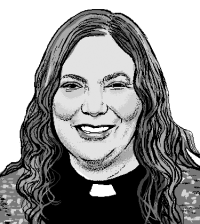Family secret: Resurrected memories
When my father boarded a ship to New York in 1938, he brought his trunks of family silver and linens—and his faith. Years later he returned to Germany with my mother and me and showed us the magnificent church where he was baptized, raised and confirmed, St. Mary’s in Lübeck.
When I was 16, my father gave me a book of sermons by Helmut Thielicke. He raved about Thielicke’s ability to connect with students, professors, farmers and shopkeepers alike. He admired the theologian’s brave repudiation of Nazi propaganda. It was a high homiletical bar set by my father, who died before I preached my first sermon but not before handing over the glorious inheritance that has shaped my life.
I recently found the manifest for the ship my father sailed on: the S.S. Europa. I was shocked, overwhelmed and disoriented when I read, beside his name, his race: Hebrew. My father was Jewish! He was descended from a Jewish family that can be traced back to the 17th century. I have not pastors but rabbis in my background, including Elijah Ba’al Shem. Legend says he created a golem (a creature made ex nihilo) who waited with an ax on market days, ready to strike anyone about to attack a Jew. When the golem’s powers became known, Elijah Ba’al took the golem to his attic and erased the holy name traced on his forehead, whereupon the golem turned back to clay. The door to the attic was permanently bolted shut. Another family rabbi, Jacob Emden, was a renowned scholar and Talmudist who defied convention by insisting that Christianity has a valuable place in God’s plan for humanity.
My grandfather’s father was a Jewish leader in Wittmund. He celebrated his 71st birthday by donating chandeliers, furnishings and altar cloths to a synagogue he helped build. In the same week that my father landed in the U.S., that synagogue was destroyed. Soon Wittmund was declared “clean,” Judenfrei.
Grandfather Moritz Neumark settled in Lübeck, directed operations in the steel plant there, and served on the city council as the only member of an anti-Nazi party. In 1934, after 28 years of civic and industrial leadership, he was pressured to retire. My father remained at the plant for several more years until his parents urged him to leave the country. Kristallnacht was only months away.
On January 27, 1943, my grandparents were transported to Terezin concentration camp, where my grandfather died. He was 77. It is likely that his ashes were dumped in the nearby Ohre River. My grandmother endured two more years in the camp. Trains left regularly to take prisoners to Auschwitz, and my grandmother, tired of life, decided to take the place of a young mother being torn from her children. She boarded the train. Unbeknownst to her, the Nazis had been paid $1.5 million to divert the train from Terezin to Switzerland, where the prisoners were met by the Red Cross. Years later, when I visited her in Switzerland, she would give me roses with all the thorns picked off and call me “meine love Heidi.” She lived to be 97.
Faith mattered deeply to my Jewish forebears and to my father. I find myself held in the continuity of their love of God and caught in their heartbreaking divide. I believe that God is caught there too. I can only assume that my grandparents’ hope for life in the waters of baptism was different from my own. One thing seems clear—they turned toward the church for the sake of their children and their children’s children. For me. Was it the right choice? It’s not for me to judge. Their judgment sent my father to these shores and gave me life. It pains me to think that my faith may have cost my grandparents theirs, that my faith is bound to their trauma and terror, though I cannot know what faith, if any, lit up the secret corners of their souls when evil came crashing down around them.
My father too paid a price to protect his family and the life he created on these shores, as if from nothing, like the rabbi and his golem. But now the past has emerged from the attic to rescue my grandfather from the oblivion his attackers planned.
The name once erased has come to light. Not Moritz, but the name my grandfather was given at birth: Moses Lazarus. Moses Lazarus drawn up from the bottom of the Ohre River, risen from decades of silence to stun me with sorrow and gratitude and a redoubled determination to raise my voice like an ax in the public square against the weaponization of faith and the demonization of peoples, to offer sanctuary to those who cross seas and barbed fronteras seeking a better future, to shelter youth branded with invisible pink triangles and dumped on the streets of our cities in the name of God, and to be gentle as a thornless rose among the wounded.
One day I will go to the Ohre River. Early in a wordless dawn, I will feel the water on my skin and remember my grandfather, Moses Lazarus.




